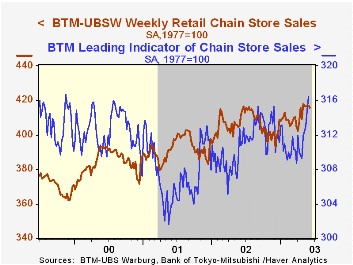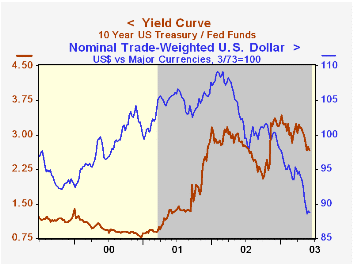 Global| Jun 10 2003
Global| Jun 10 2003Chain Store Sales Down
by:Tom Moeller
|in:Economy in Brief
Summary
Chain store sales fell 0.3% last week following four weeks of flat to down movement, according to the BTM-UBSW survey. Sales began the month of June 0.3% below the May average. During the last five years there has been a 59% [...]

Chain store sales fell 0.3% last week following four weeks of flat to down movement, according to the BTM-UBSW survey.
Sales began the month of June 0.3% below the May average.
During the last five years there has been a 59% correlation between the year-to-year percent change in chain store sales and the change in nonauto retail sales less gasoline.
The BTM leading indicator of chain store sales jumped 0.5% in the last week of May following a 0.6% gain the prior week.
The BTM-UBSW retail chain-store sales index is constructed from the sales results reported by seven retailers: Dayton Hudson, Federated, Kmart, May, J.C. Penney, Sears and Wal-Mart.
| BTM-UBSW (SA, 1977=100) | 6/07/03 | 5/31/03 | Y/Y | 2002 | 2001 | 2000 |
|---|---|---|---|---|---|---|
| Total Weekly Retail Chain Store Sales | 415.8 | 417.0 | 1.0% | 3.6% | 2.1% | 3.4% |
by Tom Moeller June 10, 2003

The Federal Reserve has been cutting the target for the federal funds rate since late 2000 to the current level of 1.25% from 6.5%.
During the period, two market based indicators of monetary policy suggested the Fed's efforts to reflate the economy were succeeding; the yield curve steepened sharply from slight inversion and the foreign exchange value of the US dollar fell roughly 13% against major currencies.
A recent narrowing of the yield curve, however, casts doubt on just how far the effort to reflate progressed. A third market based indicator, commodity prices, has been weak recently and never exhibited much protracted strength after 2000.
That leaves the depressed value of the dollar as the sole market based indicator suggesting reflation. But even it has shown recent stability rather than further decline.
New research by the Dallas Federal Reserve Bank titled "Conducting Monetary Policy in a Zero-Interest Rate Environment" can be found here.
Further comments from the President of the Federal Reserve Bank of Richmond on monetary policy in a low inflation environment are here.
Tom Moeller
AuthorMore in Author Profile »Prior to joining Haver Analytics in 2000, Mr. Moeller worked as the Economist at Chancellor Capital Management from 1985 to 1999. There, he developed comprehensive economic forecasts and interpreted economic data for equity and fixed income portfolio managers. Also at Chancellor, Mr. Moeller worked as an equity analyst and was responsible for researching and rating companies in the economically sensitive automobile and housing industries for investment in Chancellor’s equity portfolio. Prior to joining Chancellor, Mr. Moeller was an Economist at Citibank from 1979 to 1984. He also analyzed pricing behavior in the metals industry for the Council on Wage and Price Stability in Washington, D.C. In 1999, Mr. Moeller received the award for most accurate forecast from the Forecasters' Club of New York. From 1990 to 1992 he was President of the New York Association for Business Economists. Mr. Moeller earned an M.B.A. in Finance from Fordham University, where he graduated in 1987. He holds a Bachelor of Arts in Economics from George Washington University.
More Economy in Brief
 Global| Feb 05 2026
Global| Feb 05 2026Charts of the Week: Balanced Policy, Resilient Data and AI Narratives
by:Andrew Cates






